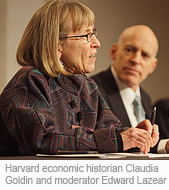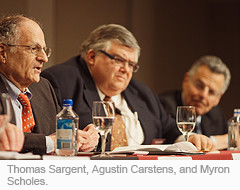
January 11, 2012
Harold Pratt House
58 East 68th Street
New York, New York
Two panels of some of the world’s most distinguished economists took on some of the biggest policy challenges of our time at this special event that introduced the Becker Friedman Institute in New York City.
University President Robert J. Zimmer told the audience of more than 220 alumni and business leaders that the Institute is devoted to expanding what has long been known as the Chicago School of Economics.
Chicago economic ideas “changed the way governments viewed their structure,” Zimmer said. “I always recall a comment George Will made after the fall of the Soviet Union and the spread of free-market systems around the world: ‘The Cold War is over, and the University of Chicago has won.’”
Zimmer highlighted several distinctive features of Chicago economics— reliance on empirical evidence, a focus on free markets and incentives, and wide-ranging application of economic analysis—that were brilliantly displayed in the panel discussions that followed.
More
»
Panel 1 – Human Capital Theory and Economic Policy
Institute Chair Gary S. Becker led off the first discussion of human capital and its  importance in a modern, information-based economy. Becker and Claudia Goldin, AM’69, PHD’72, the Henry Lee Professor of Economics at Harvard University, showed how the U.S. historically led the world in building an educational system that powered economic growth for much of the 20th century.
importance in a modern, information-based economy. Becker and Claudia Goldin, AM’69, PHD’72, the Henry Lee Professor of Economics at Harvard University, showed how the U.S. historically led the world in building an educational system that powered economic growth for much of the 20th century.
Of the three factors driving GDP growth— investment in physical capital, investment in human capital, and new technology (knowledge)—“people are the most important input,” said Kevin Murphy, PhD'86, George J. Stigler Distinguished Service Professor of Economics at Chicago Booth.
“Human capital accounts for roughly 65 percent of our productive capacity. If you don’t increase the skills of your workforce, it’s harder and harder to absorb technical innovations and advances,” Murphy said.
All three panelists pointed out a disturbing stagnation in U.S. high-school graduation rates. This translates into a workforce lacking the education and skills for today’s modern information economy. Goldin, presenting information drawn from her book with Lawrence F. Katz, The Race between Education and Technology (2008, Harvard University Press) noted that the virtues of the American education system built for a 20th-century economy are possibly no longer strengths, and called for more competition and stronger academic standards.
Murphy noted that high demand and insufficient supply of skilled, educated workers fuels the growing wage premium for college-educated workers and growing wage inequality. Since improving the educational system and the output of skilled workers could take 20 years or more, Becker a quicker fix: a market-based immigration system to bring in workers with necessary skills.
Panel 2 – Financial Markets and the Macroeconomy:
Confronting Policy Challenges
Institute Research Director Lars Peter Hansen rooted the second panel discussion firmly in the works of Milton Friedman. A superb macroeconomist, Friedman “pushed to think about the important interactions between monetary and fiscal policy, and pushed us it to think about the interaction between macroeconomic policy and financial markets,” Hansen said. He asked his panel of two Nobel laureates and a central banker to explore those issues in the context of our recent financial turbulence and the accompanying major recession.
 Commenting on fiscal decentralization in Europe, Agustin Carstens, Governor of the Bank of Mexico, drew parallels to a series of fiscal crises in Latin America in the 1970s and ’80s rooted in flawed exchange rate policies. “So what has Europe done? Europe has fixed exchange rates, not just one to another but 17 countries together,” said Carstens, AM'83, PhD'85. "To make that exchange rate arrangement sustainable, you have to make the fiscal policies consistent to fit that exchange rate policy. It’s not that difficult to see that you’d have a problem at some point in time.”
Commenting on fiscal decentralization in Europe, Agustin Carstens, Governor of the Bank of Mexico, drew parallels to a series of fiscal crises in Latin America in the 1970s and ’80s rooted in flawed exchange rate policies. “So what has Europe done? Europe has fixed exchange rates, not just one to another but 17 countries together,” said Carstens, AM'83, PhD'85. "To make that exchange rate arrangement sustainable, you have to make the fiscal policies consistent to fit that exchange rate policy. It’s not that difficult to see that you’d have a problem at some point in time.”
Myron Scholes,MBA'64, PhD'70, the 1997 Nobel laureate in economics, said that it was difficult to tell whether European nations have liquidity problems or solvency problems, which imply different solutions. “The problem with the 17 countries is that there is no consistency or a fiscal union to create a unified response.”
Asked about the ability of the new Financial Stability Oversight Commission’s capacity to identify and manage risks, Scholes noted, “Regulators had no clue the last time around. There’s no reason to believe that they’d be able to identify what’s systemic if we have no idea what systemic is.”
“The key aspect is how to address risk; we have just seen a very large underestimation of risk,” Carstens said. “We have to continue working on two measurements: risk-weighted assets and distressed value at risk.”
“When you have this idea of a systemic risk regulator, what you’ve done is cement in the notion of too big to fail. You’ve guaranteed a bailout, so [financial institutions] are going to take even more risks,” Scholes added. He noted that bank leadership also had no idea what their risks were, in part because accounting systems are so poor that balance sheets are incomprehensible.
Thomas Sargent, a 2011 Nobel laureate, pointed out that this nation was born in a massive bailout of states, when a creditor’s revolt led the fledgling federal government to assume state debt and then adopt a constitution that provided the power to tax and collect tariffs.
Panelists differed on how to deal with financial institutions deemed too big to fail. Asked if they felt the financial crisis was a market failure, there was more agreement. Scholes said that after the immediate response to the crisis, markets weren’t allowed to work. He added, “What does it mean to say markets have failed? If you look only at times when things are smooth, they seem to work but then you have a shock. Does shock and crisis mean failure?”
Carstens agreed. “I think markets have worked very well. The outcomes may not be what we like, but that’s a different thing. I wouldn’t throw the market economy out the window. I would focus on how we can improve incentives and reduce information asymmetries. The world has moved forward. We have to tackle these issues from a legal and accounting point of view, but that doesn’t mean markets have failed.”
